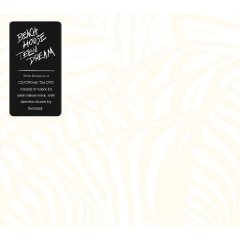The writer Sasha Frere Jones recently mused about the difficulties of musical criticism: "Is the music still confounding our expectations and startling us, or is it simply carrying on and punching the clock? Is punching the clock possibly enough for now?" He was not being disingenuous. In terms of sonic inventiveness, "punching the clock" probably describes 90% of anyone’s record collection, even Sasha Frere-Jones’. Punching the clock is warm and familiar and well-loved – it is waking up on a Sunday to Al Green or Aretha on Desert Island Discs and drifting off to ‘Sailing By’.
Beach House’s third album, Teen Dream, is not, in that sense, punching the clock. Compared to their first two uniformly gorgeous, hypnotic albums, which saw vocalist Victoria Legrand compared to Nico and Hope Sandoval, it is sped up and spread out, for a wider, bigger sound than ever before. It is Beach House does the 80s, Beach House does Talk Talk, Beach House does the Mac. Still, in the last 12 months, everyone has done Talk Talk and the Mac, from Bon Iver to Vampire Weekend – a fine timepiece, honourably punched. 80s electro is less honourable an inspiration. Parts of the album are brittle and heavy-handed – the brittle fragility of Beach House and Devotion is harder to find here. Opener ‘Zebra’ fades in with an insistent, repetitive guitar line before a galloping four-to-the-floor kick drum ushers in waves of tinny crash cymbals and euphoric synths. There are a lot of four-to-the-floor beats, tinny crash cymbals and euphoric synths on Teen Dream.
Teen Dream also rides hard on the coattails of Two Suns – ‘Norway’ sounds uncannily like ‘Daniel’, while the hackneyed piano of ‘Real Love’ traces a line back to ‘Moon and Moon’ – and Beach House do not need to do Bat for Lashes, because Natasha Khan is a far less evocative and nuanced vocalist than Legrand. Khan is really just a breathy ingénue, while Legrand is teasing and forbidding, sultry and narcotic, woozy and visionary. But when Legrand’s voice is asked to speed up, to enunciate, to make dramatic Björk-like leaps of register or decibel; when it is corralled into more pragmatic verse-chorus-verse four-bar progressions than Beach House have previously used, some of its mystery melts away. At times it sounds strained, almost hoarse. ‘Used to Be’, a lighter version of which was released last year as a single, feels heavy here, with louder, pushy vocals and a new piano line that wavers between rollicking and ponderous.
Still, while some of the new imposed structures are awkward, some are delightfully weird. ‘Lover of Mine’ slips between a funk backbeat, droning bass and icy synths that weave beautifully round cascading Stevie Nicks vocals. Beach House can only benefit from experimenting with pace – where before, whole albums have been extended atmospheric exercises, Teen Dream toys dramatically with loud and quiet, climaxes and denouements. Moments of awkwardness aside, the album’s textures and moods are often gorgeously captivating and always interesting. For other bands, these reference points might be mere clock-punching, but Beach House sound as though they are starting to stretch their wings.


